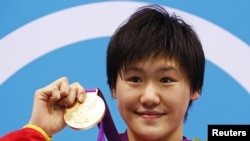Observers say doping accusations against a young Chinese swimming superstar are the latest chapter in what has become a sometimes tense geopolitical rivalry between the United States and China.
After six days of Olympic competition, China and the U.S., the world's two largest economies, are locked in a close race for the most gold medals, with each country so far winning 18.
One of the biggest stories has been the success, and consequent criticism, of Ye Shiwen. The 16-year-old Chinese swimmer's stunning performance has earned her gold medals in both the women's 200-meter and 400-meter events.
Ye's world record-shattering race last Saturday was "unbelievable" and "disturbing," according to top U.S. coach John Leonard. His comments reflected the concern of many who are aware of China's history of doping. Nonetheless, the speculation set off a firestorm of criticism from the Chinese media.
'Western prejudice'
A commentary in China's official Xinhua news agency said the doping accusations against Ye, who has passed drug tests, are the result of a "stubborn prejudice" by Western media who are "exerting every effort to blacken the performance of Chinese athletes."
But the paper said the issue is larger than just a sports rivalry. The West, it said, is "upset with the rise of China" and is unwilling to recognize that it has become the world's second largest economy.
"As long as China made progress in science and technology, economic and social development, the Western world was busy making up stories of 'cheating' or 'violating international rules,'" the paper said, an apparent reference to recent squabbles between Washington and Beijing over various trade and economic issues.
Projection of national power
Beijing, which views the games as an important indicator of its progress on the world stage, has made huge investments in recent years to ensure that it becomes a global sporting powerhouse, says Phil Lutton, a reporter for Australia's Brisbane Times.
So he says it should come as no surprise that Chinese athletes such as Ye have achieved a good deal of success during this year's Olympic games.
"China's poured an enormous amount of resources post-Beijing (Olympic games) into their sporting programs and athletics programs. You see them dominating in a number of fields at the Olympics, including weightlifting, and swimming is one of them," says Lutton.
New rivalry brewing?
Lutton says he sees an athletic rivalry developing between the U.S. and China, much like the 1970s and 1980s Olympic rivalry between the U.S. and Soviet Union that mirrored the Cold War.
And while the U.S. and China typically excel at different sporting events, resulting in relatively few head-to-head matchups, Lutton says the competition has helped make the games more exciting, particularly in the swimming competition.
"I think it's a good rivalry, (and) we need good rivalries in swimming and sport," he says. "It only adds another layer of intrigue to what's happening around the Olympic pool."
Victor Beattie contributed to this report
Photo Gallery: Day 6 of Competition
After six days of Olympic competition, China and the U.S., the world's two largest economies, are locked in a close race for the most gold medals, with each country so far winning 18.
One of the biggest stories has been the success, and consequent criticism, of Ye Shiwen. The 16-year-old Chinese swimmer's stunning performance has earned her gold medals in both the women's 200-meter and 400-meter events.
Ye's world record-shattering race last Saturday was "unbelievable" and "disturbing," according to top U.S. coach John Leonard. His comments reflected the concern of many who are aware of China's history of doping. Nonetheless, the speculation set off a firestorm of criticism from the Chinese media.
'Western prejudice'
A commentary in China's official Xinhua news agency said the doping accusations against Ye, who has passed drug tests, are the result of a "stubborn prejudice" by Western media who are "exerting every effort to blacken the performance of Chinese athletes."
But the paper said the issue is larger than just a sports rivalry. The West, it said, is "upset with the rise of China" and is unwilling to recognize that it has become the world's second largest economy.
"As long as China made progress in science and technology, economic and social development, the Western world was busy making up stories of 'cheating' or 'violating international rules,'" the paper said, an apparent reference to recent squabbles between Washington and Beijing over various trade and economic issues.
Projection of national power
Beijing, which views the games as an important indicator of its progress on the world stage, has made huge investments in recent years to ensure that it becomes a global sporting powerhouse, says Phil Lutton, a reporter for Australia's Brisbane Times.
So he says it should come as no surprise that Chinese athletes such as Ye have achieved a good deal of success during this year's Olympic games.
"China's poured an enormous amount of resources post-Beijing (Olympic games) into their sporting programs and athletics programs. You see them dominating in a number of fields at the Olympics, including weightlifting, and swimming is one of them," says Lutton.
New rivalry brewing?
Lutton says he sees an athletic rivalry developing between the U.S. and China, much like the 1970s and 1980s Olympic rivalry between the U.S. and Soviet Union that mirrored the Cold War.
And while the U.S. and China typically excel at different sporting events, resulting in relatively few head-to-head matchups, Lutton says the competition has helped make the games more exciting, particularly in the swimming competition.
"I think it's a good rivalry, (and) we need good rivalries in swimming and sport," he says. "It only adds another layer of intrigue to what's happening around the Olympic pool."
Victor Beattie contributed to this report
Photo Gallery: Day 6 of Competition









